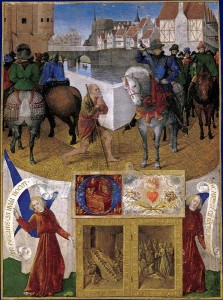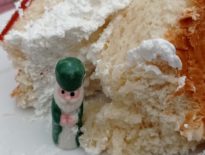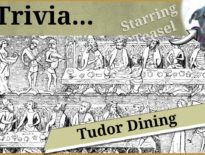
The Charity of St. Martin by Jean Fouquet
Today is Martinmas, the traditional day for slaughtering animals in Tudor times.
11th November was the Feast of St Martin of Tours, a 4th century Hungarian born man who grew up in Pavia, Italy, and who knocked on the door of his local Christian church at the age of 10, begging to be made a catechumen, i.e. one who is receiving training in doctrine and discipline before baptism. Martin followed his father into the Roman army at the age of 15 and a story tells of how, when he was about eighteen years of age, he cut his woollen cloak in half with his sword and gave half to a beggar to keep him warm. He then had a dream where he saw Christ surrounded by angels and wearing the half of the cloak that Martin had given to the beggar. Christ then turned to his angels and said, “Martin, as yet only a catechumen, has covered me with his cloak.” This dream caused Martin to be baptised and to give his life to God. Martin then found that his Christian conscience was incompatible with his duties as a soldier. He refused to fight at a battle, saying “I am a soldier of Christ. I cannot fight”, and was jailed for a time for cowardice. He spent the next few years living as a monk.
In 361, he was consecrated at Bishop of Tours, in France, after being tricked by the people of Tours. He was not interested in becoming the new bishop, but the people wanted this charitable and pious man as their bishop and so tricked him into visiting Tours to visit a sick woman. When Martin arrived in the city the people surrounded him, forcing him to accept their will. Martin felt it was his Christian duty to convert non-Christian to the faith, and so travelled from house to house speaking to people about Christianity. He was also committed to destroying pagan places of worship. It is said that when he tried to persuade some pagans to fell a pine tree they worshipped, they agreed to do so but only if Martin stood directly in its path. He agreed and as it started to fall he made the sign of the cross and the tree miraculously missed him.
Martin died on 8th November 397 (or somewhere between 395 and 402) and was buried on 11th November in the Cemetery of the Poor.
In medieval and Tudor times, Martinmas was the traditional day for slaughtering animals. The Tudor Monastery Farm team explain: “This served two purposes. It took the strain off of the farms in trying to keep alive large animal stocks and it ensured a good source of meat throughout the winter months.” It wasn't just farms that would keep and slaughter animals, it was common for families to have a family pig that would be killed at Martinmas and the meat salted to preserve it. In her book “The Tudor Housewife”, Alison Sim writes: “If the pork was salted hot, it took two ounces of salt for each pound of meat, plus another two ounces of saltpetre. If the pork was soaked in brine instead, then the brine had to be strong enough for an egg to float on it. According to my own experiments, that meant using at least five ounces of salt for each pint of water. No wonder salt was treasured.”
The old English and Spanish saying “His Martinmas will come as it does to every hog” (A cada cerdo le llega su San Martín), meaning “he will get his comeuppance”, refers to the Martinmas slaughter. Where I live in Andalucia, “la matanza”, the annual slaughter of pigs, is still carried out around 11th November and it is still traditional for families in rural areas to rear a pig annually for meat. Families and friends get together for the slaughter. I've never been to one – I'm not sure I fancy it – but it's supposed to be a combination of celebration and work. Spaniards pride themselves on every bit of the pig being used, hence the Andalucian phrase “the only part of a pig you can’t eat is its squeak/squeal”, so as the carcass is butchered sausages are made, blood is drained for “morcilla” (blood sausage), and parts that need eating straight away are cooked and eaten, washed down with plenty of homemade wine and beer.



What fun article, spoken in a way I will remember.